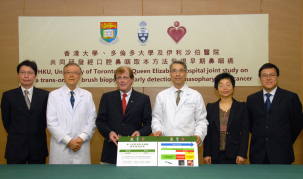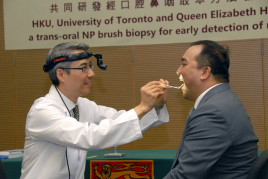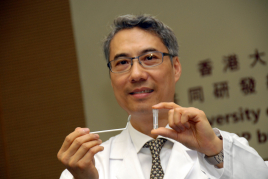Media
HKU, University of Toronto and Queen Elizabeth Hospital joint study on a trans-oral NP brush biopsy for early detection of nasopharyngeal cancer
19 Mar 2014
Nasopharyngeal cancer (also known as Nasopharyngeal Carcinoma, NPC) is a highly treatable disease if it is detected at an early stage. However, because of the obscure location of the nasopharynx (NP), most patients only seek medical advice when the cancer has already developed into advanced stages. In view of this, Li Ka Shing Faculty of Medicine, The University of Hong Kong (HKU), in collaboration with the University of Toronto and Queen Elizabeth Hospital, has developed a novel trans-oral NP brush biopsy test for early detection of NPC. Based on the results of the study, the new method, compared with traditional methods, is simple and effective, and can be used as an ambulatory and non-invasive mass screening tool for early detection of NPC.
Research Implications
One of the leading researchers, Professor Patrick Gullane, Professor of Department of Otolaryngology-Head and Neck Surgery, Faculty of Medicine, the University of Toronto says, “Symptoms of early NPC may not be apparent and some tumors are located in the submucosa, making early detection very difficult. The new test is simple and non-invasive. Screening can be done trans-orally by family physicians or nurses in primary care clinics. High-risk individuals with a family history of NPC or with persistent positive results in Epstein Barr Virus (EBV), one of the human herpesviruses, serology tests can take this new test to detect NPC early and improve survival rates.”
Professor William Wei, Emeritus Professor and Honorary Clinical Professor of Department of Surgery, Li Ka Shing Faculty of Medicine, HKU adds, “We hope that the test can be applied on a large scale global screening of NPC, especially in those regions where specialists, sophisticated endoscopes and equipment to preserve tumor samples are not readily available.”
Dr Raymond Ng, Assistant Professor of Department of Otolaryngology - Head and Neck Surgery of Faculty of Medicine, the University of Toronto, who leads the study, adds, “Though the exact cause of NPC is still unknown, infection by the EBV is considered critical and necessary for the cancer to develop. Using the trans-oral NP brush biopsy test, together with the application of the Quantitative Polymerase Chain Reaction (Q-PCR) analysis technology, only a very small quantity of cells taken from the NP is needed for the detection of EBV DNA, for further diagnosis of NPC. Thus, this test is capable of detecting NPC at very early stages, even before the emergence of any abnormalities detectable by endoscopy or other methods.”
Study method and findings
From 2001 to 2010, Li Ka Shing Faculty of Medicine, HKU, the University of Toronto and Queen Elizabeth Hospital jointly developed a trans-oral brush to access the NP and extract the epithelial cells from the NP for biopsy.
A total of 600 people were recruited for this study. They were either patients diagnosed with NPC or high-risk individuals with symptoms suspicious for NPC or with a family history of this cancer. All subjects underwent the trans-oral NP brush biopsy. Samples collected were analysed for the presence of EBV DNA using the Q-PCR technology, and pathological tests were conducted to confirm the diagnosis of NPC.
The results show that the sensitivity and specificity rates of the trans-oral NP brush biopsy test for NPC reach 99%. In other words, the rate of erroneous diagnosis is only 1%, which is much better than all known tests available so far. In addition, a good proportion of patients were detected as having NPC at early stages with the aid of the new method. The test also helped identify five NPC patients who were previously considered as not having the disease using the traditional endoscopy method. With the new test, one person was detected as potentially developing NPC, one year prior to the appearance of apparent clinical symptoms.
Future Study
In the coming months, two clinical studies will be conducted using the trans-oral NP brush biopsy test in two clinical settings. Meanwhile, Professor Dora Kwong, Clinical Professor and Head, Department of Clinical Oncology, Li Ka Shing Faculty of Medicine, HKU, is currently conducting a clinical study to examine if this new method can be used to detect early local recurrence of cancers in patients who have received radiation therapy.
Background
Nasopharyngeal Carcinoma (NPC) is one of the most common head and neck cancers among people in Southern China, Southeast Asia, the Arctic, North Africa and the Middle East, as well as ethnic Chinese communities in different countries. It is ranked as the 7th most prevalent cancer in Hong Kong which is more commonly found in males than in females (male/female ratio, 3:2). According to Hong Kong Cancer Registry, 862 new cases of NPC were recorded in 2011.
About the Research Team
The study is led by Dr Raymond Ng, Assistant Professor of the University of Toronto, with other members from Li Ka Shing Faculty of Medicine, HKU, Queen Elizabeth Hospital, and the University of Toronto. The study is published in the Otolaryngology-Head and Neck Surgery, a Journal published by the American Academy of Otolaryngology-Head and Neck Surgery Foundation.
Please visit the website at http://www.med.hku.hk/v1/news-and-events/press-releases/ for press photos and powerpoint presentation.
(From Left to Right)
- Dr Roger Ngan Kai-cheong, Chief of Service and Consultant, Department of Clinical Oncology, Queen Elizabeth Hospital and Director, Hong Kong Cancer Registry, Hospital Authority
- Professor William Ignace Wei, Emeritus Professor, Honorary Clinical Professor,Department of Surgery, Li Ka Shing Faculty of Medicine, HKU
- Professor Patrick J Gullane, University Health Network, Wharton Chair Head and Neck Surgery, Professor, Department of Otolaryngology - Head and Neck Surgery, Professor of Surgery, Faculty of Medicine, University of Toronto
- Dr Raymond Ng Hin-wai, Assistant Professor, Department of Otolaryngology - Head and Neck Surgery, Faculty of Medicine, University of Toronto
- Professor Dora Kwong Lai-wan, Clinical Professor and Head, Department of Clinical Oncology, Li Ka Shing Faculty of Medicine, HKU
- Dr Raymond Tsang King-yin, Clinical Assistant Professor, Department of Surgery, Li Ka Shing Faculty of Medicine, HKU
Brush the NP one or two times with the angled brush (Left) to extract a small amount of the epithelial cells, and put the samples into the specially-developed solution for preservation (Right). Samples collected are then analysed for the presence of Epstein Barr Virus DNA using the Q-PCR technology.
Professor William Ignace Wei, Emeritus Professor, Honorary Clinical Professor of Department of Surgery, Li Ka Shing Faculty of Medicine, HKU said the trans-oral NP brush biopsy test is simple and effective compared with traditional methods, and can be used as an ambulatory and non-invasive mass screening tool for early detection of Nasopharyngeal Carcinoma (NPC) .





